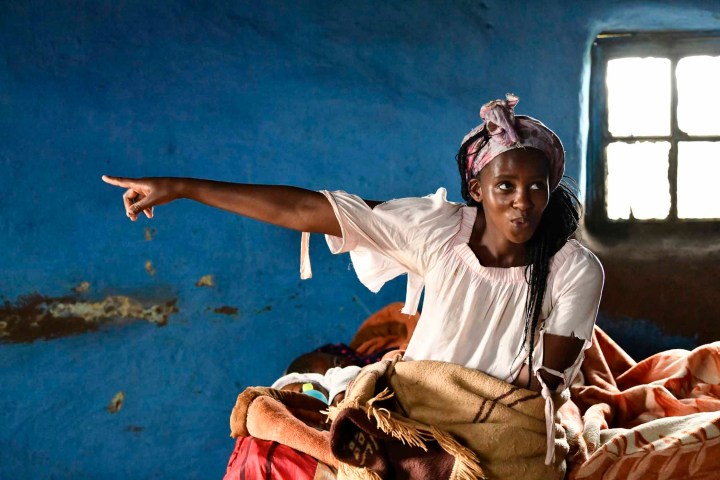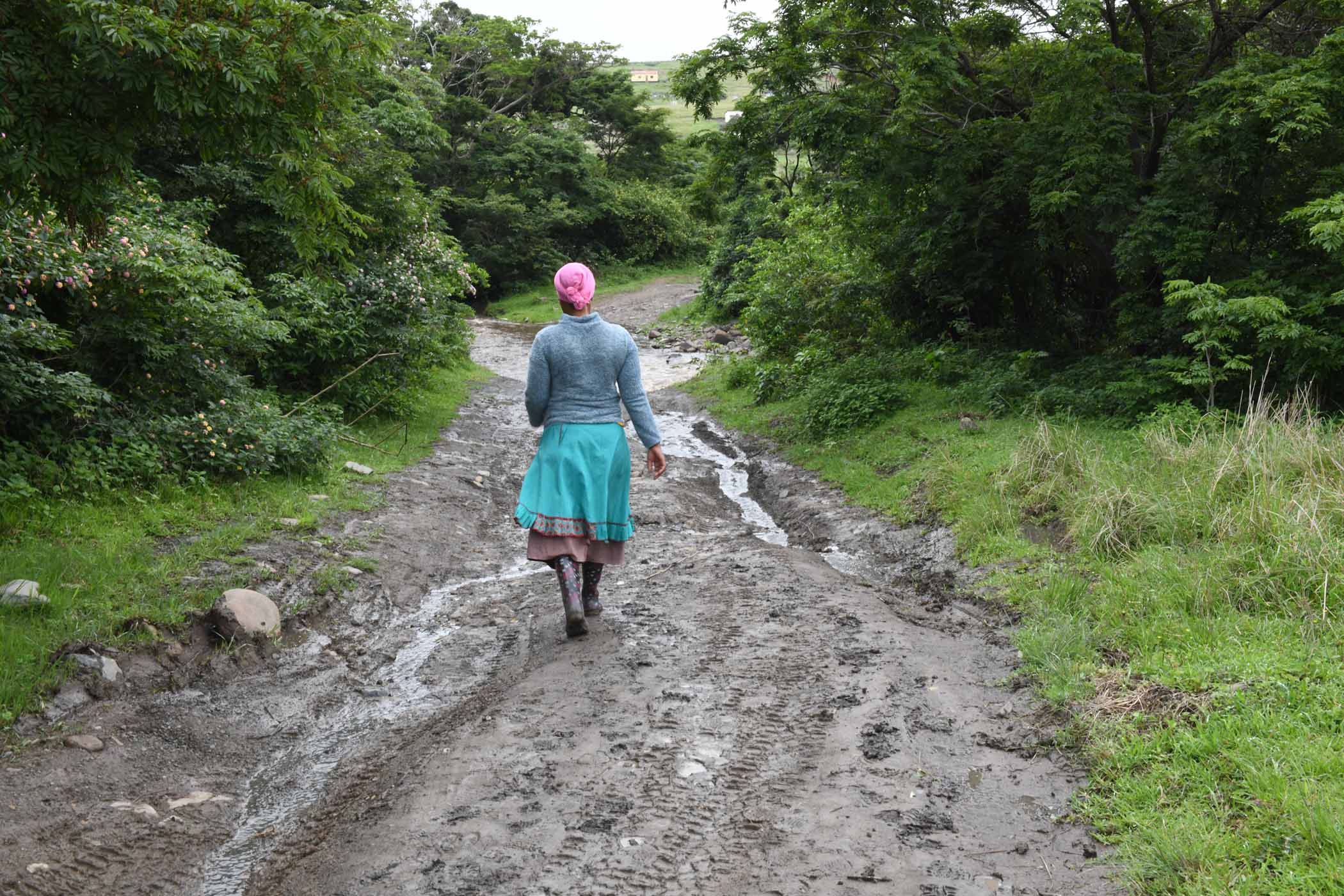SPOTLIGHT
Eastern Cape emergency: Ambulances still a rare sight for the people of Xhora Mouth

It is more than a year since Spotlight visited rural Xhora Mouth to report on locals’ challenges in accessing healthcare. Not much has changed as the province’s EMS woes drag on.
Asathandile Rulumeni (25) from Tshezi village in the Eastern Cape’s Xhora Mouth area never thought she would give birth at home one day because of a lack of emergency medical services (EMS). She says the ordeal of delivering her second son alone will traumatise her forever.

Asathandile Rulumeni says the ordeal of delivering her second son alone outside her home will forever traumatise her. (Photo: Black Star / Spotlight)
Rulumeni says she grew up in Xhora Mouth, 100km from Mthatha, using only a mobile clinic that visits the area once a month. However, the service is intermittent, meaning a long wait between visits.
Residents have to walk long distances and cross the dangerous Xhora River to get to the nearest clinic in Nkanya Village about 15km away. There is no public transport or tarred road to Xhora Mouth, so villagers are forced to navigate thick bush. Sometimes ambulances do not turn up at all.

A distance of 15km to the nearest clinic looks very different in rural areas such as Xhora Mouth to urban areas. When the Xhora River is in flood, villagers cannot cross to get to a clinic. (Photo: Black Star / Spotlight)
Rulumeni is one of many women in the area with horrific experiences of going into labour without professional medical help, which often means giving birth at home or in the back of hired transport on their way to Zithulele Hospital about 39km away.
Not all babies born without proper medical help survive. Spotlight understands a baby died at birth in November on the way to hospital in a private vehicle, after the ambulance failed to show up. The family was not willing to talk about the incident.
The lack of EMS is a longstanding problem in many rural areas in the Eastern Cape.
When pregnancy becomes ‘an ordeal’
Rulumeni was lucky. She delivered her son safely without emergency patient transport. The young mother says she went into premature labour, but there was no money for private transport to hospital.

Xhora Mouth resident Zonwabele Yani has to cross the Xhora river to get to a clinic. (Photo: Black Star / Spotlight)
“I went for my antenatal services at Nkanya Clinic, where nurses told me that I was going to deliver on 9 February [2020]. I had prepared [so] that I would be at the hospital two days before [because] transport is a problem here. To my surprise, on 1 January I started experiencing painful contractions while at home,” says Rulumeni, whose son is now 11 months old.
“The pains didn’t stop, and the following morning I eventually delivered prematurely when I was doing house chores. I immediately called EMS for an ambulance to take me to Zithulele Hospital. Despite EMS’ assurance that an ambulance was on its way, it never arrived, making me very concerned. Private transport was demanding R700 for a one-way trip to the hospital, which I did not have.

Travel in Xhora Mouth is difficult as there is no public transport or tarred road, prompting villagers to navigate the elements and thick bush when they go to the clinic. (Photo: Black Star / Spotlight)
“The following day I hitchhiked to the hospital. Giving birth in that [way] stripped me of my dignity and violated my human rights. It is high time the government sees the urgency of providing ambulances in our village because some mothers or their babies won’t be lucky enough to survive the ordeal.”
Noluthando Mbele of Folokwe Village is worried too.
Setting off at 5am, the pregnant 28-year-old tackles a “gruelling” three- to four-hour walk to the nearest clinic for antenatal check-ups.

Getting to villages in Xhora Mouth is difficult as there is no public transport or tarred road. Villagers navigate the elements and thick bush when they go to the clinic. (Photo: Black Star / Spotlight)
During Spotlight’s visit, the river was in flood, making it even more dangerous for someone in Mbele’s condition to cross.
“I’m worried about what I will do when I am due for delivery.”
For many women like Mbele and Rulumeni, the prospect of giving birth is not something to be excited about, but a cause of great anxiety.
Mbele says she is worried because few women make it to hospital on time for delivery because ambulances are scarce. “Some go to hospital [sometimes] a week before their promised date of delivery. Staying at the hospital is not easy because they have to sleep on benches, waiting for their dates.”
The difference between life and death
A nurse from Madwaleni Hospital, about 54km from Folokwe, who spoke on condition of anonymity, says poor access to ambulances “puts the lives of patients at serious risk as some have to [be] carted by wheelbarrow”.

Wheelbarrows are an important mode of transport for the sick in Xhora Mouth. Nokubonga Nkasithu, Phumzile Msaro (in front) and Noluthando Mbele (in wheelbarrow) demonstrate how they operate wheelbarrows to move patients around. (Photo: Black Star / Spotlight)
“Pregnant women are being assisted by ordinary women to deliver their babies. Sometimes to have the right person with professional knowledge to manage an emergency will make a difference between life and death of the mother or the baby.”
Eastern Cape Health Department spokesperson Sizwe Kupelo says the allocation of ambulances is not based on geographical considerations, but on district offices. “We’ve got a centralised system. If people need ambulances they call a common number, 10177, [which] goes to the nearest centre that may dispatch their ambulances. We also use helicopters to respond to some emergencies.
“It is not true that people of Xhora Mouth have no access to ambulance services because everybody in the province who uses that number gets ambulance assistance. People sometimes use [the] 112 number which doesn’t belong to the department. It’s a helpline for cellphone networks and it delays. That number doesn’t go directly to our call centre.”
Some residents say “health workers told them” to use the 112 number because they do not have landlines to call 10117. Dialling 112 is free from a cellphone, but they need airtime to call 10117.

Xhora Mouth resident Nosizwe Silele’s husband had a stroke — she says the ambulance never showed up. (Photo: Black Star / Spotlight)
For Nosizwe Silele of Nqileni Village, accessing health services is a struggle for her husband, who had a stroke in August and needs physiotherapy every month.
She has “resorted” to forking out R700 to get to Zithulele Hospital.
Silele says that in an emergency such as a stroke, the first hour after the incident could be the difference between life and death. “It is not wise to wait for an ambulance that we are not sure whether or not it will arrive.
“Since August, we have been going to hospital for his physiotherapy sessions, using his social grant to pay R700 for a single trip. We are often left with very little money after we spent R1,400 on transport each month. Sometimes I have to borrow money from loan sharks to survive.”
Another resident, Nolindile Mbele, tells Spotlight that since arriving in Folokwe Village as a newlywed in 1985 she has seen an ambulance in the village twice.
“Every time I need to access [a] hospital I have to hire a car at a cost of R700 while at night they charge R800. Recently I transported my ill husband to Madwaleni Hospital after he fell sick. If it was not for the private car that I hired his chances of surviving were slim.”
Their fate is ‘sealed’

Nokubonga Nkasithu, secretary of the local clinic and ambulance committee. (Photo: Black Star / Spotlight)
Nokubonga Nkasithu, secretary of the clinic and ambulance committee in Xhora Mouth, says residents are in dire need of ambulances.
“Mothers give birth in private cars on their way to hospital. Some give birth at home because ambulances arrive late or fail to come. Several people in our villages have lost their lives while waiting for ambulances to arrive. Had ambulances been closer at hand, I believe some of the deaths could all have been avoided,” she says.
Nkasithu cannot say how many have died in this way, but “this has been happening over and over again”.
She recalls when an old man from Nqileni village was stabbed in the upper body, was rushed to hospital in private transport but was declared dead on arrival.
“Ambulances should be strategically placed in rural areas to service patients as quickly and effectively as possible,” she says. “People spend long hours waiting for an ambulance to collect patients requiring hospitalisation. The poor response time and lack of ambulances mean that the fate of patients in outlying areas such as Xhora Mount is sealed, as ambulances will never reach them in time.”
Nkasithu says a satellite ambulance service in Xhora Mouth will greatly improve response times. “People are now becoming casualties of food insecurity because they used their social grants to hire private transport. Without proper nutrition none of our people would be healthy and more people will get sick.”
Eastern Cape Health Crisis Action Coalition coordinator and SECTION27 field researcher Thoko Mtsolongo says it is frustrating that nothing is being done about EMS in Xhora Mouth.
“The department of health has many stories when it comes to EMS services,” she says.
Mtsolongo is calling for a satellite ambulance centre with off-road vehicles, including 4x4s, that can drive into deep rural areas.
“If the department of human settlements is able to send material for RDP houses in deep rural areas, why can’t the department of health not send its services? Until the department of health addresses this issue of shortage of ambulances across all districts, the citizens of this province will continue to be at the mercy of a system that fails them instead of a system that saves their lives,” he says.
The provincial health department’s 2020-21 annual report, released in May 2020, said it would replace 269 EMS vehicles, including 20 heavy-duty mobile clinic trucks, to increase access to health services for most rural areas, especially those very far from urban centres.
In the report, Health MEC Sindiswa Gomba promised to improve access to good-quality EMS.
In February 2020, she convened a summit to address key issues plaguing the industry. The department says a strategic plan was developed aimed at improving turnaround times for vehicles in repair and improving EMS response times.
The report said R1.4-billion had been set aside to ensure the provision of emergency services and patient transport in terms of applicable norms and standards and to procure systems to secure ambulances and crews.
But for now, the people of Xhora Mouth have to wait. DM/MC
NOTE: SECTION27 is mentioned in this article. Spotlight is published by SECTION27 and the TAC, but is editorially independent, an independence that the editors guard jealously. Spotlight is a member of the South African Press Council.
This article was produced by Spotlight – health journalism in the public interest. Sign up for our newsletter.




















 Become an Insider
Become an Insider
Comments - Please login in order to comment.